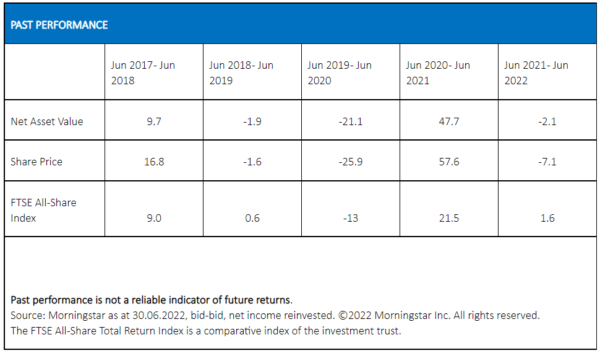Aug
2022
Meet the Manager: Alex Wright, Fidelity Special Situations & Special Values PLC
DIY Investor
17 August 2022
Morningstar Meet the Manager: Q&A with Alex Wright

 In a wide-ranging interview at Morningstar’s UK Investment Conference, Alex Wright, portfolio manager of Fidelity Special Situations & Special Values PLC, reflects on the recent challenges facing investors in domestic equities.
In a wide-ranging interview at Morningstar’s UK Investment Conference, Alex Wright, portfolio manager of Fidelity Special Situations & Special Values PLC, reflects on the recent challenges facing investors in domestic equities.
He analyses how the market environment is likely to evolve over the coming months and why he believes value stocks and sectors look well placed to reward investors.
Key points
- We believe it is a good time to invest in UK equities. We have seen strong relative performance from the UK market year-to-date compared to other major developed markets.
- While we are excited about some new ideas emerging in the UK, we believe it is prudent to maintain some dry powder to reinvest as we prepare for a range of outcomes going forward.
- We expect value stocks to continue to outperform as the current environment of higher inflation, rising interest rates and economic volatility tends to favour value over growth

Is now the time to buy UK equities?
It is obviously a very difficult time for investors given all the geopolitical and economic issues globally. But as a UK fund manager, I feel lucky because while those uncertainties are also present for UK equities, the big difference is that valuations in the UK are attractive compared to other markets. So, there is a lot of uncertainty but also plenty of opportunities. I believe now is a good time to invest in UK stocks and pleasingly, we’ve seen strong relative performance from the UK market year-to-date compared to other markets.
To what extent is the market volatility throwing up some interesting investment opportunities?
There has been a huge divergence in performance between different parts of the market. The overall UK market has not declined significantly in absolute terms, but some companies have lost a lot of value, while areas such as oil and gas and mining have gained meaningfully.
When you see this degree of volatility, it does throw up new opportunities. However, you have to be aware of the risks in terms of higher inflation and slower economic growth. And while we are excited about the new ideas that are coming into the portfolio today, we are keeping some dry powder to reinvest. There are a range of possible outcomes going forward and the uncertainty about those outcomes is unusually high.
We have seen some outperformance from value stocks and sectors this year. Can this continue?
It is pleasing to see the UK market, and value investing in particular, finally outperforming. Unlike the previous short, sharp value rallies seen over the last 10 years, what’s different this time is that value stocks have been outperforming even as markets have been falling.
This is particularly encouraging and something that we have not seen since 2007. The last 15 years have been marked by low interest rates, low inflation and low growth. With low cost of capital and low discount rates, some growth companies have seen astronomical valuations compared to where they’ve been historically. This has been a headwind for the value style which focuses on lower rated companies where cash flows and earnings are much shorter dated.
The current environment of higher inflation, positive interest rates and economic volatility is what we have seen over the last 100 years. The last 10-15 years have been an outlier. So as a value manager, I very much hope we are returning to that more normal world. It may feel uncomfortable as you can’t just buy and hold a small subset of companies as many investors have done. In this new environment, you need to be agile and constantly looking for new ideas, which plays to our strengths in fundamental research.
What differentiates your portfolios from others?
Investors are spoilt for choice in the UK in terms of the number of funds that they can invest in. We have over 200 competitors in the IA UK All Companies sector, but when you drill down, most of these funds have a growth style.
Over the last 10 years or so, investors across the globe have gravitated to growth stocks because of their strong outperformance. Indeed, there are very few value managers left in the UK and our portfolios are fairly differentiated. From my point of view, this is a good thing as there’s less competition, not just for flows, but also in terms of the types of stocks we look for. It is much harder to generate uncorrelated stock specific excess return if you’re just doing the same thing that other investors are doing. In contrast, if you’re looking at a sector that has been overlooked and where there’s much less competition, you stand a very good chance of finding those hidden gems that can add significant value.
Can you outline your current positioning and outlook for the rest of the year?
Our aim is to ensure that the portfolios are always strongly diversified. We have around 100 holdings in Special Situations and 115 in Special Values. We have about 50% invested in mid and small caps, with broad exposure to a range of sectors.
This is particularly important given the uncertain economic environment. We don’t know exactly how the current inflationary pressures and growth slowdown are going to affect companies. As a result, we want to ensure we’ve got exposure across the market in both defensive and cyclical areas. For example, this year our holdings in consumer cyclical areas have had a tough time, but our exposure to banks, life insurance and oil and gas stocks have held up well.
Whatever the economic backdrop, we are looking for stock specific, idiosyncratic performance to come through and that’s what we have seen so far this year.
Important information
The value of investments and the income from them can go down as well as up, so you may get back less than you invest. Past performance is not a reliable indicator of future returns. Overseas investments are subject to currency fluctuations. The shares in the investment trust are listed on the London Stock Exchange and their price is affected by supply and demand. The investment trust can gain additional
exposure to the market, known as gearing, potentially increasing volatility. The trust invests more heavily than others in smaller companies, which can carry a higher risk because their share prices may be more volatile than those of larger companies and the securities are often less liquid. This trust uses financial derivative instruments for investment purposes, which may expose it to a higher degree of risk and can cause investments to experience larger than average price fluctuations. Investors should note that the views expressed may no longer be current and may have already been acted upon. This information is not a personal recommendation for any particular investment. If you are unsure about the suitability of an investment you should speak to an authorised financial adviser.
The latest annual reports, key information document (KID) and factsheets can be obtained from our website at www.fidelity.co.uk/its or by calling 0800 41 41 10. The full prospectus may also be obtained from Fidelity. The Alternative Investment Fund Manager (AIFM) of Fidelity Investment Trusts is FIL Investment Services (UK) Limited. Issued by Financial Administration Services Limited, authorised and regulated by the Financial Conduct Authority. Fidelity, Fidelity International, the Fidelity International logo and F symbol are trademarks of FIL Limited. UKM0722/371141/ISSCSO00084/1122
Commentary » Investment trusts Commentary » Investment trusts Latest » Latest » Mutual funds Commentary » Uncategorized
Leave a Reply
You must be logged in to post a comment.